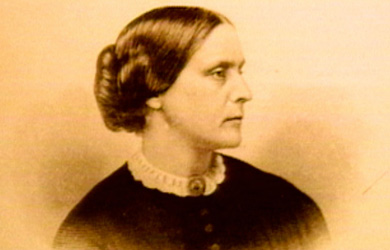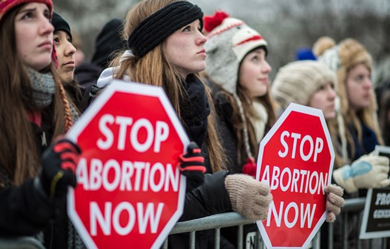Here at Right Wing Watch, we write a lot about the fringe efforts, now increasingly embraced by mainstream conservatives, to challenge Roe v. Wade in the courts by passing radical “personhood” and “heartbeat” bills. But there is a parallel effort, embraced by major conservative groups and the mainstream GOP, to gradually chip away at Roe by passing incremental state-level bills that cut down on access to abortion services.
Today, People For the American Way released a report outlining five increasingly common ways state governments are undermining women’s right to choose, including implementing TRAP laws, funding crisis pregnancy centers, imposing mandatory waiting periods, banning “race- and sex-selective” abortions, and interfering with the doctor-patient relationship.
But while extreme attacks on reproductive rights – such as radical “personhood” bills that threaten to criminalize even some forms of birth control – rightly receive significant attention and opposition, more incremental anti-choice proposals frequently escape wide notice and face minimal resistance as they become law. Often presented as “common-sense” or “women’s health” measures, these laws are in fact meant to gradually chip away at reproductive health access, undermining the foundation of long-standing rights.
By passing mandatory ultrasound and waiting period laws, or requiring doctors to provide inaccurate medical information, anti-choice politicians create a culture in which women’s rights are up for grabs. As conservatives call for smaller government, they pass laws that intrude into our most private and significant decisions, put a script in our doctors’ hands, and tell us we do not know our own minds. In addition, these laws are meant to chip away at women’s constitutionally protected right to autonomy over our own bodies in a deliberate attempt to undermine Roe v. Wade.
The report also looks at the impact of the movement to pass “personhood” and “heartbeat” bills, which even as it is rejected by voters and courts, presents a real threat to women’s rights.
Since the Supreme Court affirmed a woman’s right to choose an abortion in 1973’s Roe v. Wade, anti-choice activists have been split on how to go about restricting abortion rights. Several major anti-choice groups, including Americans United for Life, argue for taking incremental measures in legislatures and in the courts to chip away at Roe’s protections. AUL’s general counsel once compared his group’s approach to carving a Christmas ham: “Each slice makes it smaller and smaller until it is no more.”
While this “slice-by-slice” approach still dominates the anti-choice movement, more extreme attacks on choice have begun to enjoy some success in states and in the U.S. Congress. These blatantly unconstitutional head-on attacks on Roe – including “personhood,” “heartbeat” and “fetal pain” measures – are frequently blocked by voters, legislatures and the courts. But even if these measures never become law, they present a real threat to women’s health: By spreading these extreme views, anti-choice activists create a culture in which established rights are questioned, abortion providers live in fear and women’s health access continues to be up for debate.
While incremental measures such as those outlined above provide the greatest immediate threat to women’s healthcare access, it is important to also understand the risks posed by extreme broadsides on Roe v. Wade. In fact, anti-choice advocates see even these extremist laws as incremental steps in chipping away at abortion rights: Even if personhood and heartbeat bills are overturned upon challenge, they have succeeded in calling abortion rights into question, and forcing pro-choice groups to spend time and money fighting these unconstitutional bans.
Read the full report here.






